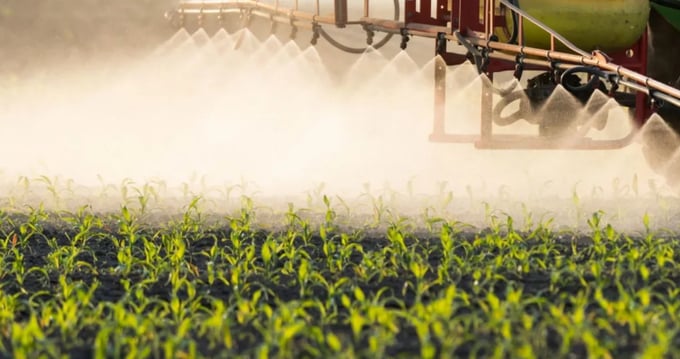June 2, 2025 | 07:57 GMT +7
June 2, 2025 | 07:57 GMT +7
Hotline: 0913.378.918
June 2, 2025 | 07:57 GMT +7
Hotline: 0913.378.918

Photo: iStock
We often like to inspect a piece of fruit for any blemishes before taking a bite. Now, a recent Consumer Reports analysis has peeled back the layers on the produce we consume, revealing a concerning truth: Many fruits and vegetables come with an unexpected and potentially harmful addition - pesticides.
The food we eat is often laden with pesticides, some of which can pose serious health risks. Despite efforts to regulate their use, dangerous pesticides are still prevalent in many popular fruits and vegetables. When one pesticide is banned from use, other equally or more dangerous alternatives replace them.
"It's two steps forward and one step back - and sometimes even two steps back," said James E. Rogers, who oversees food safety at Consumer Reports.
As reported by The Guardian, Consumer Reports recently conducted an extensive review of pesticide levels in produce, analyzing seven years of data from the U.S. Department of Agriculture.
It found that 20% of the foods examined - bell peppers, blueberries, green beans, potatoes, and strawberries among them - had significant pesticide risks. Importantly, imported produce, particularly from Mexico, was more likely to carry risky levels of pesticide residues.
Pesticides, while instrumental in protecting crops from pests and diseases, can have harmful effects on both human health and the environment.
Chronic exposure to pesticides has been linked to various health issues, including increased risks of cancer, diabetes, and cardiovascular disease. Additionally, certain pesticides can act as endocrine disruptors, interfering with hormonal systems and potentially leading to reproductive problems and developmental issues.
Moreover, pesticides can contaminate soil, waterways, and wildlife, disrupting ecosystems and harming nontarget species like bees, birds, and aquatic organisms. Reducing pesticide use and transitioning to more sustainable agricultural practices are critical steps in safeguarding both human health and the environment.
Consumer Reports' analysis offers valuable insights into reducing exposure to harmful pesticides. By choosing produce rated low-risk or organic options, consumers can limit their pesticide exposure. For instance, nearly all organic produce in the analysis had low or very low pesticide risk. Opting for organic, especially for the highest-risk foods, significantly reduces pesticide exposure. Additionally, avoiding certain imports, particularly from Mexico, can lower the risk further.
To come up with their recommendations, Consumer Reports analyzed data from nearly 30,000 individual food samples. It rated the risk of each fruit or vegetable based on factors such as the number of pesticides found, their concentration, and toxicity.
Consumer Reports urges regulators to take stronger action. It recommended banning the use of organophosphates and carbamates, two classes of pesticides responsible for most of the risk. Additionally, it advocated for better inspection of imported foods, more support for organic farming, and increased research into the risks of pesticides.
By making informed choices about the produce we consume and advocating for stricter regulations, consumers can reduce their exposure to harmful pesticides.
(TCD)

(VAN) Vikas Rambal has quietly built a $5 billion business empire in manufacturing, property and solar, and catapulted onto the Rich List.

(VAN) Available cropland now at less than five percent, according to latest geospatial assessment from FAO and UNOSAT.

(VAN) Alt Carbon has raised $12 million in a seed round as it plans to scale its carbon dioxide removal work in the South Asian nation.

(VAN) Attempts to bring down the price of the Japanese staple have had little effect amid a cost-of-living crisis.

(VAN) Fourth most important food crop in peril as Latin America and Caribbean suffer from slow-onset climate disaster.

(VAN) Shifting market dynamics and the noise around new legislation has propelled Trouw Nutrition’s research around early life nutrition in poultry. Today, it continues to be a key area of research.

(VAN) India is concerned about its food security and the livelihoods of its farmers if more US food imports are allowed.